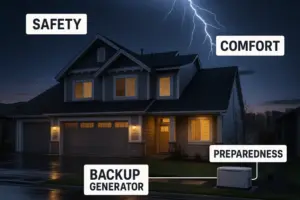Home Improvement
Protect Your Home: Why a Backup Generator Makes Sense for Unpredictable Weather
Key Takeaways
- Home backup generators provide uninterrupted power during outages, ensuring comfort and safety.
- They can prevent costly damages associated with power loss, such as spoiled food and frozen pipes.
- Installing a generator may increase property value and potentially lower insurance premiums.
As weather events become more frequent and severe, the importance of having a reliable backup power source in homes has become increasingly important. Power outages are now common, often with little warning, and a backup generator can provide safety, comfort, and functionality during emergencies. Investing in a home backup generator is not just a short-term solution but a future-proof decision that benefits your household, financial stability, home value, and insurance standing. Understanding the importance of backup generators and selecting, installing, and maintaining the right system empowers you to control your property’s safety and long-term value.
Ensuring Uninterrupted Power Supply
Power outages can disrupt daily activities, especially for families with young children, elderly relatives, or those relying on electric medical devices. Modern home backup generators in Melbourne detect power failures and automatically restore electricity to vital systems, ensuring lights, HVAC, and appliances remain operational. Uninterrupted power offers numerous benefits, especially in regions like Florida, where storms and hurricanes are common. Backup generators protect homes from discomfort and danger, making them a cornerstone of modern home resilience. More families are investing in generators for peace of mind, knowing their comfort and security are not at risk due to unpredictable weather or aging infrastructure.

Preventing Costly Damages
Power outages can lead to significant expenses, including the spoilage of perishable foods and medications, freezing pipes during winter storms, and flooding due to malfunctioning sump pumps. Even brief power outages can cost hundreds or thousands of dollars to repair. Having a backup generator can mitigate these scenarios by ensuring critical appliances and home systems continue to function without interruption. Investing in a backup generator can protect your deep freezer, heating system, sump pump, and other essential devices, preventing financial headaches and emotional stress that can follow sudden emergencies.
Enhancing Property Value
Homebuyers today prioritize preparedness and resilience, leading to higher interest and better offers in the competitive real estate market. Installing a backup generator is a forward-thinking upgrade that distinguishes a home from others. This ensures the home can withstand extreme weather conditions or infrastructure failures, especially in regions prone to hurricane activity or frequent power outages. Real estate professionals highlight generators as premium features during property showings and online listings, attracting serious buyers and resulting in higher offers and faster sales. Investing in a generator is more than convenience; it’s about future-proofing your asset.
Potential Insurance Benefits
Backup generators offer financial protection beyond physical property savings, as insurance companies recognize that homeowners with backup power systems are less likely to file claims for losses related to power outages. Some insurers reward proactive homeowners with discounts or credits on their insurance premiums. To qualify for these discounts, connect with your insurance provider and maintain documentation of your generator’s professional installation and service history. For more information on insurance coverage and power outages, refer to this resource.
Choosing the Right Generator
To choose the best generator for your home, consider your essential power requirements, wattage needs, and the power output of all appliances and systems. Select a generator with sufficient capacity to support all devices simultaneously. Consider fuel types such as gasoline, propane, diesel, or natural gas, based on local availability, delivery logistics, cost per gallon, and storage requirements. Standby generators are ideal for providing whole-house coverage, while portable generators are suitable for smaller homes or powering a few essential appliances. Consult an expert to assess your situation, recommend appropriately sized products, and ensure the generator integrates safely into your existing systems. For more guidance on sizing and selection, consult a comprehensive generator buying guide from Consumer Reports.
Professional Installation and Maintenance
Licensed professionals ensure the reliability and safety of your backup generator by managing the setup, obtaining necessary permits, and verifying that all connections comply with code. DIY installation can lead to equipment failure and void warranties. They also advise on optimal placement and integrate automatic transfer switches for power restoration. Regular maintenance, including oil and filter changes, diagnostic tests, and fuel source checks, is crucial for generator safety. Establishing a service contract with a reputable provider reduces the risk of failure.
Conclusion
Whether you’ve faced the frustrations of past outages or are proactively safeguarding your home for the future, installing a home backup generator is a wise decision. Its value extends from day-to-day comfort during storms to protecting you from thousands in avoidable property damage. You also stand to gain from potential home value and insurance benefits—advantages that grow more relevant as weather events increase in severity and frequency.














